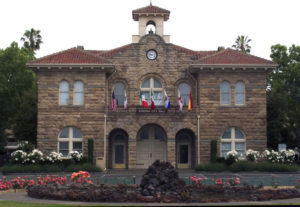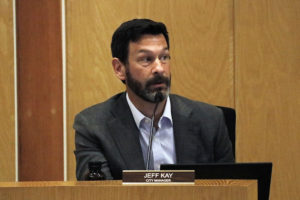
While the offices of the City of Healdsburg remain closed until after the New Year celebrations, what can best be described as “grumbling” continued in the weeks following the last City Council meeting, on Dec. 16.
Not the Grinch kind of grumbling, but the dissatisfied complaints of residents about the way the city is handling the split into districts for a California Voting Rights Act-compliant way to elect city officials, including mayor and council members. At that Dec. 16 meeting, which doubled as a “public hearing” for the transition, the City Council essentially agreed to keep the status quo as much as possible, despite the fact that the legal requirements it faces are to toss out the status quo and start all over.

The grumbling attained legal emphasis just after Christmas, when on Dec. 26 Healdsburg attorney Jon Eisenberg filed a letter with the city that raised a number of alleged Brown Act violations during the lead-up to the Measure O vote in November, violations he clearly is prepared to take to court.
He then raises concerns about the Dec. 16 City Council meeting itself, suggesting that additional Brown Act violations took place in that process as well.
Taking it a step further, on Dec. 27, Eisenberg’s own counsel, Christian E. Baker of Manatt, Phelps & Phillips, presented a “cure” letter, requiring the city to “to cure or correct the Brown Act violations” and declare the city’s Dec. 16 decision “null and void,” based on Eisenberg’s assertions.
Public Hearings
Under terms of the California Voting Rights Act, the city needs to hold five public hearings during the transition to district-based elections. Healdsburg held its first on Dec. 16 during a regular City Council meeting, a “public hearing” agenda item that took more than two hours.
Every subsequent public hearing will also be held during a regularly scheduled council meeting (the next is Jan. 6, 2025), regardless of the fact that the point of the public hearings is to reshape the City Council itself. There are however two “community workshops” in addition to the required five public hearings, one on Thursday, Jan. 16, at the Community Center; the other Friday, Jan. 24, at the Senior Center.
The structure of the public hearing was indistinguishable from any other council deliberation—a presentation, then the council members weighing in with questions, then a public comment period, then the council discussing this issue among themselves. The hearing portion of the meeting took over two hours, with eight people weighing in during public comment.

The result was a strong sense from the council to retain five council members, to be elected by district, with a “weak mayor” office rotating among them whose duties are largely ceremonial. As Councilmember Chris Herrod said, “The status quo is where I’d like to keep it, with five members and rotating mayor.” Three others quickly agreed, though Councilmember Ariel Kelley remained unconvinced.
Coincidentally, the City of Sonoma is also currently engaged in the process of crafting districts for city elections. It held its first public meeting on the topic on Dec. 18, two days after Healdsburg’s. Sonoma is using the same consultant in the process as well, Paul Mitchell of Redistricting Partners.
Unlike Healdsburg, however, Sonoma never received a letter from the law firm of Shenkman & Hughes, but undertook the process on its own, thus avoiding the $30,000 in legal fees Shenkman has extracted from other cities, including Healdsburg.
A Second Letter
Mark McMullen, who was the only member of the public to send a letter to the City Council before its Dec. 16 hearing, expressed his irritation later that week in a second letter. “While I advocate for a 6-district system with an elected mayor, I believe ALL potential options should be on the table and thoroughly aired for public debate. The Council’s premature decision, based on the premise that the current system ‘works’ and a wish to maintain the ‘status quo,’ prevented the opportunity for meaningful discussion and circumvented the possibility of improving broader representation,” he wrote.

Before the recent brouhaha, City Manager Jeff Kay said, “My sense from the meeting is that the City Council feels that the current system is working well, and they want to focus on the process of determining the districts. I think that’s reasonable. In a perfect world, we’d have lots of time to consider every variable, but we don’t have that luxury right now.”
Eisenberg’s correspondence of Christmas Week must have been an unwelcome present for the City of Healdsburg. As he said bluntly in his Dec. 26 letter regarding Brown Act violations and other matters, including the city’s 15 month backlog in producing minutes of public meetings: “Plainly this misbehavior is deeply embedded in the culture of our city government. It continues to this day as the City Council addresses a controversial forthcoming switch from at-large to district election of its members. The purpose of this letter is to help set the City Council on a law-abiding path.”
City offices have been closed from Dec. 24 to present, and will not reopen until Monday, Jan. 6—the same day as the next City Council meeting and the next public hearing on the transition of district elections, at 6pm at 401 Grove St.
This article differs from the one published in the Jan. 2, 2025 print Healdsburg Tribune.
See this recent explainer on What Is the Brown Act.








Make Jon Eisenberg mayor of Healdsburg. Let him solve his own problem.
It would be nice if The Spittoon explained what the Brown Act is and where it came from for some context.
My wife and I have owned a home here in Healdsburg for over 25 years. The town has changed a lot. What hasn’t changed is that the downtown businessmen run this town. It just doesn’t matter how we vote. It just doesn’t matter if or how the city voting is split into districts.
Because we, the citizens of Healdsburg, just don’t matter to the City Council or the business owners and landlords downtown.
I agree with Timmy, no matter how we vote the monied interests always call the shots and get their way in city politics. I guess that’s kind of the American way now but the influx of the super wealthy into our town has made everything worse as these folks are used to always getting what they want and have the money to buy city government. They come for the “country charm” and then work hard to monetize and destroy it for a quick buck.
The Tribune should explain what the Brown Act is and how it was allegedly violated by council members in regard to the Measure O campaign and the redistricting effort. Then the reporter needs to ask the council members some tough questions about their understanding of it and if they had any sense they might have been violating it with their actions.